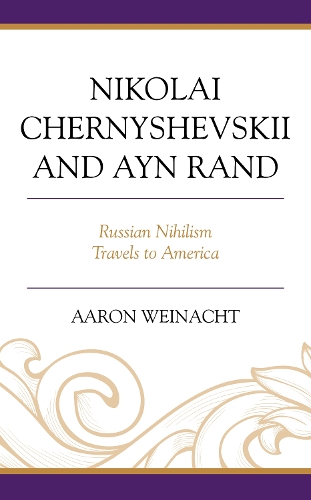
Nikolai Chernyshevskii and Ayn Rand: Russian Nihilism Travels to America
(Hardback)
Publishing Details
Nikolai Chernyshevskii and Ayn Rand: Russian Nihilism Travels to America
By (Author) Aaron Weinacht
Bloomsbury Publishing PLC
Lexington Books
7th October 2021
United States
Classifications
Professional and Scholarly
Non Fiction
History
Language: reference and general
891.78
Physical Properties
Hardback
182
Width 161mm, Height 228mm, Spine 18mm
485g
Description
Nikolai Chernyshevskii and Ayn Rand: Russian Nihilism Travels to America argues that the core commitments of the nihilist movement of the 1860s made their way to 20th century America via the thought of Ayn Rand. While mid-nineteenth-century Russian nihilism has generally been seen as part of a radical tradition that culminated in the Bolshevik Revolution of 1917, the author argues that nihilisms intellectual trajectory was in fact quite different. Analysis of such sources as Nikolai Chernyshevskiis What is to Be Done (1863) and Ayn Rands Atlas Shrugged (1957), archival research in Rands papers, and broad attention to late-nineteenth century Russian intellectual history all lead the author to conclude that nihilisms legacy is deeply implicated in one of Americas most widely-read philosophers of capitalism and libertarian freedom.
Reviews
Aaron Weinacht furthers the important project of exploring the Russian roots of Ayn Rands thought. In this superb study of the influence of the Russian nihilist traditionespecially the works of Nikolai Chernyshevskiion Rand, Weinacht presents a provocative reinterpretation of the context that shaped her literary and intellectual legacy. This is a profoundly significant contribution to the scholarly literature on one of the most misunderstood thinkers of the twentieth century.
-- Chris Matthew Sciabarra, author of Ayn Rand: The Russian RadicalWeinacht's study of Ayn Rand's Russian antecedents opens an exciting new dimension into the life of one the twentieth century's most controversial thinkers.
-- William Benton Whisenhunt, College of DupageThis elegantly written and rather surprising intellectual history reveals the unexpectedly close relationship between 19th century Russian radical thinkers and the 20th Century anti-communist objectivism of Ayn Rand. Aaron Weinacht demonstrates that Rand was profoundly influenced by Nikolai Chernyshevskii and came to nihilist conclusions about egoism, heroism, human suffering, human creativity, the role of religion and the nature of sexuality. Weinacht's sophisticated analysis shows that Rand was both participant in and product of Russian revolutionary philosophical debates, and that the Russian Revolution of 1917 and American libertarian capitalism today share the same philosophical roots.
-- Karen Petrone, University of KentuckyAuthor Bio
Aaron Weinacht is professor of history at the University of Montana Western.
